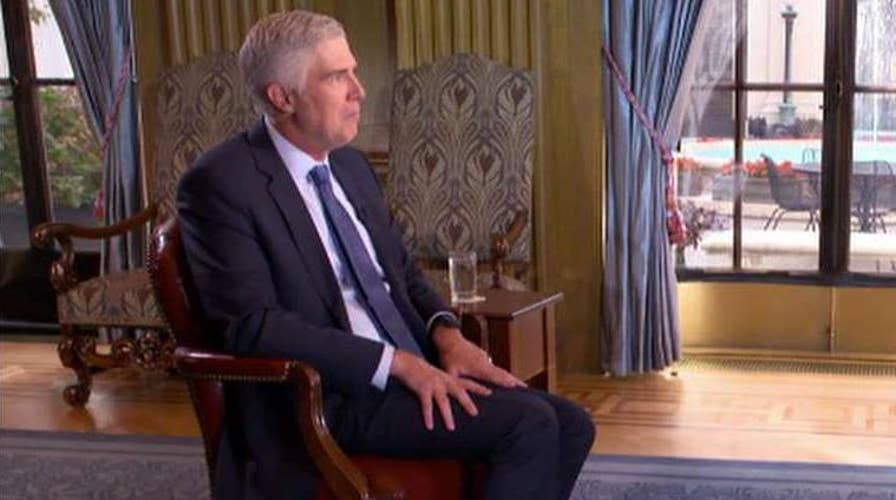Justice Gorsuch on his relationship with Justice Brett Kavanaugh
In part 4 of Sandra Smith's interview, Gorsuch stresses that he and Kavanaugh have their own independent points of view.
Supreme Court Justice Neil Gorsuch labels himself an “Originalist.”
“I don’t do politics. I stick to my lane. I’m a judge,” Gorsuch explained.
In an exclusive sit-down interview, Gorsuch told “America’s Newsroom” host Sandra Smith that he believes in the words of the Constitution.
“Honor those words. Don’t make stuff up and don’t take things away,” he told Smith.
The Justice from Colorado was appointed, after a confirmation process, in March of 2017. He had previously clerked with multiple Justices—Justice Anthony Kennedy and Justice Byron White—as well as Judge David B. Sentelle of the U.S. Court of Appeals for the D.C. Circuit.
Shortly after that, another Trump-nominated Justice, Brett Kavanaugh—a man Gorsuch became well acquainted with over the past 40 years—was confirmed in October of 2018. But that came only after a series of extremely rocky public confirmation hearings and allegations of sexual harassment.
“I’ve known Brett for 40 years, probably,” Gorsuch said. “And, I think very highly of him as a person and as a colleague. And, it’s been a delight to have him here.”
Additionally, Gorsuch shed some light on the relationships between the Supreme Court Justices. He said his colleagues are “very special, strong, independent, kind, people.”
“This is a very small institution. There are nine of us. You’re asking about our collegiality—this court. And, like every court I’ve been associated with, it’s a wonderful place to work…We eat lunch together. We eat dinner at one another’s homes. We play practical jokes on one another once in a while. And, we shake hands every time we gather. And, that’s a tradition that’s gone on for 150 years, maybe.”
Not much has changed in those 150 years according to Gorsuch. He says that the United States court system remains one of the “wonders” of the world, telling Smith that those who believe judges skew a certain way are setting themselves up for disappointment.
“And then they get very confused when it doesn’t break down that way all the time,” he laughed. “There are 50 million cases filed in the United States every year. We’re a pretty litigious bunch…In the federal system about 95 percent of those cases are resolved by a trial judge or a jury at the trial level and never even appealed.”
Gorsuch continued: “Now, the losing party probably thinks the judge was wrong. But, they accept it as reasonably just and fair. Only five percent of cases get to the court of appeals—my old court—sit in panels of three…Very diverse group of people from every walk of life…We would agree unanimously in our cases 95 percent of the time.”
“Out of those 50 million cases how many get up to the Supreme Court of the United States? About 70 a year. That’s it,” he said. “Try to get nine people to agree on where to go to lunch. We agree on the cases our lower court colleagues have disagreed on. We agree unanimously 40 percent of the time. And, that number has been more or less the same since the Second World War. Nothing’s changed.”
Gorsuch maintained that 5-4 decision cases were equally as just: “On those 5-4 cases there were 10 different combinations of Justices this last term on those 5-4 cases. Now, they don’t report those things, but those are the facts.”
He also said that during the confirmation process, he had come to the realization that our country may be losing sight of things like the separation of powers and civic understanding.
“‘We the people’ are the first three words of the Constitution. We’re supposed to govern ourselves, but how can we do that if we don’t know how our government works?” he asked.
Gorsuch said that what makes America strong is the “raucous nature of a Republic,” but that for it to work “we also have to respect one another. And listen as well as talk. And tolerate, as well as demand tolerance of our point of view.”
He urged that when Americans disagree, they disagree because they “both love the country.”
He continued: “…Our job isn’t to do what we want—what we like. It’s to make sure that the law—that’s enacted by the people’s representatives—is applied fairly and equally to everyone.”
“It’s an honor and I’m humbled for the opportunity to serve the American people,” he concluded.
His new book “A Republic If You Can Keep It” is out now.





